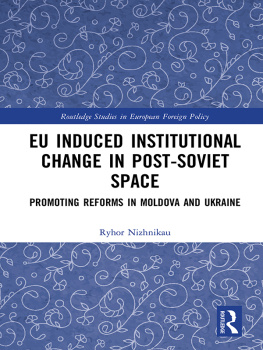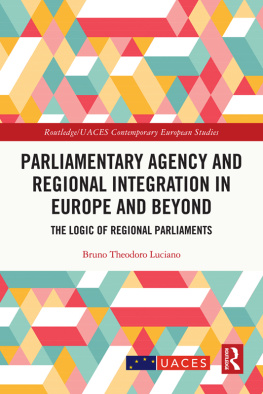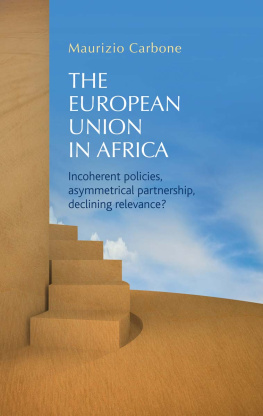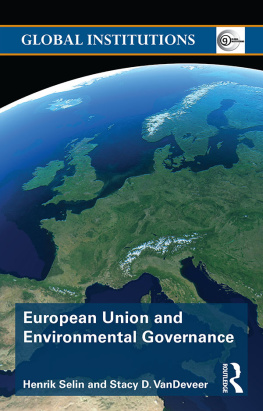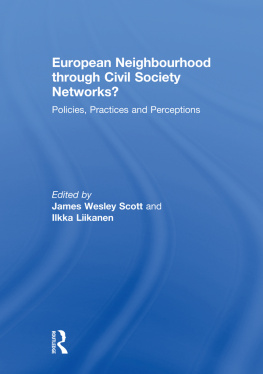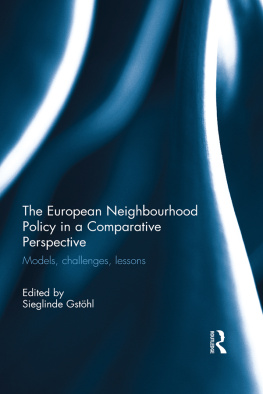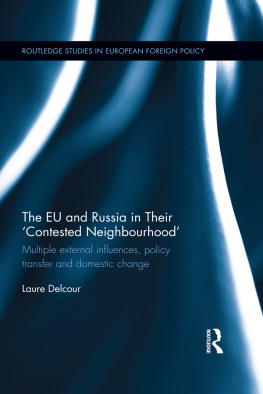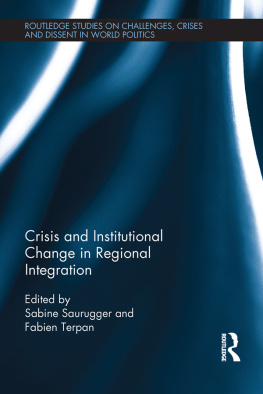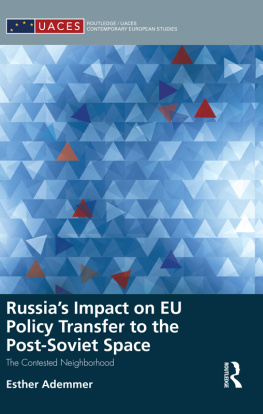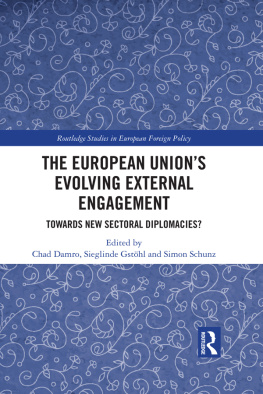EU Induced Institutional Change in Post-Soviet Space
This book analyses the role of the European Union in the process of institutional change in its Eastern neighbourhood and explains why EU policies arrive at contradictory outcomes at the sectoral level. Combining EU studies approaches with insights from the fields of new institutionalism, international development studies and transnationalisation, it explains how the EU policies contribute to rule persistence or lead to institutional change.
Highlighting the importance of investigating how the policies of external intervention interact with domestic institutions, the book also provides a coherent presentation of the political and economic problems of Ukraine and Moldova and a comparative analysis in key areas at critical junctures of their development.
This book will be of key interest to scholars and students of European Union politics and more broadly to International Relations, post-Soviet and Russian studies.
Ryhor Nizhnikau is Senior Research Fellow in the EUs Neighbourhood and Russia Programme at the Finnish Institute of International Affairs, Finland.
Routledge Studies in European Foreign Policy
Series Editors: Richard Whitman, University of Kent, UK, and Richard Youngs, University of Warwick, UK.
This series addresses the standard range of conceptual and theoretical questions related to European foreign policy. At the same time, in response to the intensity of new policy developments, it endeavours to ensure that it also has a topical flavour, addressing the most important and evolving challenges to European foreign policy, in a way that will be relevant to the policy-making and think-tank communities.
EU Security Missions and the Israeli-Palestinian Conflict
Amr Nasr El-Din
The EU and Russia in Their Contested Neighbourhood
Multiple External Influences, Policy Transfer and Domestic Change
Laure Delcour
Europe and Iran
The Nuclear Deal and Beyond
Cornelius Adebahr
EU-Russia Relations in Crisis
Understanding Diverging Perceptions
Edited by Tom Casier and Joan DeBardeleben
The European Unions Evolving External Engagement
Towards New Sectoral Diplomacies?
Edited by Chad Damro, Sieglinde Gsthl and Simon Schunz
EU Induced Institutional Change in Post-Soviet Space
Promoting Reforms in Moldova and Ukraine
Ryhor Nizhnikau
For more information about this series, please visit: https://www.routledge.com/Routledge-Studies-in-European-Foreign-Policy/book-series/RSEFP
EU Induced Institutional Change in Post-Soviet Space
Promoting Reforms in Moldova and Ukraine
Ryhor Nizhnikau
First published 2019
by Routledge
2 Park Square, Milton Park, Abingdon, Oxon OX14 4RN
and by Routledge
711 Third Avenue, New York, NY 10017
Routledge is an imprint of the Taylor & Francis Group, an informa business
2019 Ryhor Nizhnikau
The right of Ryhor Nizhnikau to be identified as author of this work has been asserted by him in accordance with sections 77 and 78 of the Copyright, Designs and Patents Act 1988.
All rights reserved. No part of this book may be reprinted or reproduced or utilised in any form or by any electronic, mechanical, or other means, now known or hereafter invented, including photocopying and recording, or in any information storage or retrieval system, without permission in writing from the publishers.
Trademark notice: Product or corporate names may be trademarks or registered trademarks, and are used only for identification and explanation without intent to infringe.
British Library Cataloguing in Publication Data
A catalogue record for this book is available from the British Library
Library of Congress Cataloging in Publication Data
A catalog record has been requested for this book
ISBN: 978-1-138-56976-8 (hbk)
ISBN: 978-0-203-70410-3 (ebk)
This work was made possible only due to invaluable help, guidance and encouragement from my colleagues and friends. Finnish Institute of International Affairs offered generous support and intellectually stimulating environment to develop ideas and write. I am especially grateful to Arkady Moshes for his in-depth insights and invaluable support with this project.
I benefitted immensely from generous hospitality of Institute for Russian and Eurasian Studies at Uppsala University and the Centre for EU-Russia Studies at University of Tartu over the years. I am particularly indebted to Stefan Hedlund, Viacheslav Morozov and Leonid Polishchuk for their invaluable advice and kind support. Sofie Bedford, Tom Casier, Antoinetta Dimitrova and Jussi Lassila offered great suggestions on this work.
I am truly indebted to my interviewees in Moldova and Ukraine, who devoted their time and efforts to help me with this research. I also gratefully acknowledge kind assistance of the Series Editors Richard Whitman and Richard Youngs and two anonymous reviewers. Their comments helped to improve this work significantly. Special thanks to Andrew Taylor, Sophie Iddamalgoda and Julia Hanney for their assistance with this project.
On a final and most important note, this book would be impossible without the support of my family. I am very grateful to my mother and sister for everything.
The story of EU-induced institutional change in Ukraine and Moldova is one of both successes and failures. Both the EU studies literature and European Commissions reports have suggested that Ukraine and Moldova have been the most active reformers in the Eastern neighbourhood. In both countries, the EU, alongside the other Western donor institutions, attempts to induce change by designing and transferring its sophisticated rules. Rule transfer is backed up by a set of economic, financial, expert and knowledge assistance and a build-up of state-of-the-art state structures, which turned Kyiv and Chisinau into the largest recipients of EUs external support. The external efforts are seemingly reinforced by the positive development on the ground. Local elites proclaim their serious determination to adhere to the EU plans talking about civilisational choices and pledging to live anew. Pro-EU popular revolutions as well as shifts in societal attitudes shall guarantee the sustainability of the reforms.
However, the results are less convincing. By 2017, despite profound attempts to induce institutional change in Moldova and Ukraine, the EU has arrived at contradictory reform outcomes even in sectors which are the most susceptible to EU-induced reform those of migration and environmental protection. Against the background of the biggest foreign policy success ever the Enlargement of the European Union to Central and Eastern Europe in 2004, and the amounts of resources and knowledge invested this fact seems quite disturbing. In reality, despite significant investments by various transnational regimes in the development and transformation of the post-Soviet countries, after more than ten years of active EU involvement in building peace and prosperity at its borders, its induced economic and political reforms resulted in persistence of old rules, more conflicts and less economic and political stability. More than that, the EU major transformative initiatives coincided with the large societal shocks and the erosion of pluralism and even gradual power monopolisation. How the EU policies account for these outcomes and the observed variations is one of the main interests of this study.

